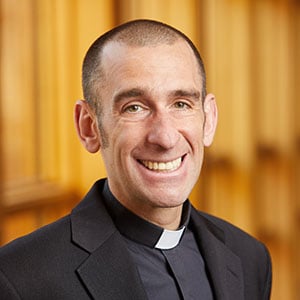.png?width=300&height=300&name=Work%20(1).png)
The film Saint Ralph (2004) tells the story of a teenager who undergoes intense spiritual and physical training to become a saint and win the 1954 Boston Marathon—a potential miracle he hopes will wake his mother from a coma. Early on in his training, Ralph fails to keep up with Father Hibbert, his coach and former Olympic marathon hopeful, who is riding a bike just ahead of him while steadily increasing his speed. As Ralph struggles to catch his breath, stay on his feet and prepare for the next interval, Fr. Hibbert councils him, saying: “Once you break, it's over. You can redline all you want, but you never go past the breaking point until the final sprint. All right?”
Then, after sending Ralph out for a five-minute jogging recovery, he gives him one of the greatest compliments a coach can give to an endurance athlete: “…by the way, you have an incredible capacity for work.”
On Monday, the Church celebrated St. Joseph the Worker, a feast established in 1955 by Pope Pius XII to emphasize the dignity of human labor and the Christian ideals of work. The dignity of work (and the rights of workers) is one of the seven themes of Catholic Social Teaching. Work finds its dignity insofar as it is a way of continuing participation in God’s creation. In his encyclical Laborem Exercens, Pope St. John Paul the Great said that: “…work is a good thing for man—a good thing for his humanity—because through work man not only transforms nature, but he also achieves fulfillment as a human being and indeed, in a sense, becomes ‘more a human being.’” And our current Holy Father, Pope Francis, in Amoris Laetitia notes that:
“…it is clear from the very first pages of the Bible that work is an essential part of human dignity; there we read that ‘the Lord God took the man and put him in the garden of Eden to till it and keep it’ (Gen 2:15). Man is presented as a laborer who works the earth, harnesses the forces of nature and produces ‘the bread of anxious toil’ (Ps 127:2), in addition to cultivating his own gifts and talents.”
I’m praying for our students in the final days of the academic year that they feel the presence and holy steadiness of St. Joseph the Worker. May they be encouraged by their “incredible capacity for work” in this last sprint. And in producing “the bread of anxious toil,” may they become more fully human, knowing that their dignity lies not in the grades, but in their being created by God—for even when the grades are in, they will always be called to collaborate with God in the work of creation.

 Fr. Ryan Lerner, Chaplain
Fr. Ryan Lerner, Chaplain


